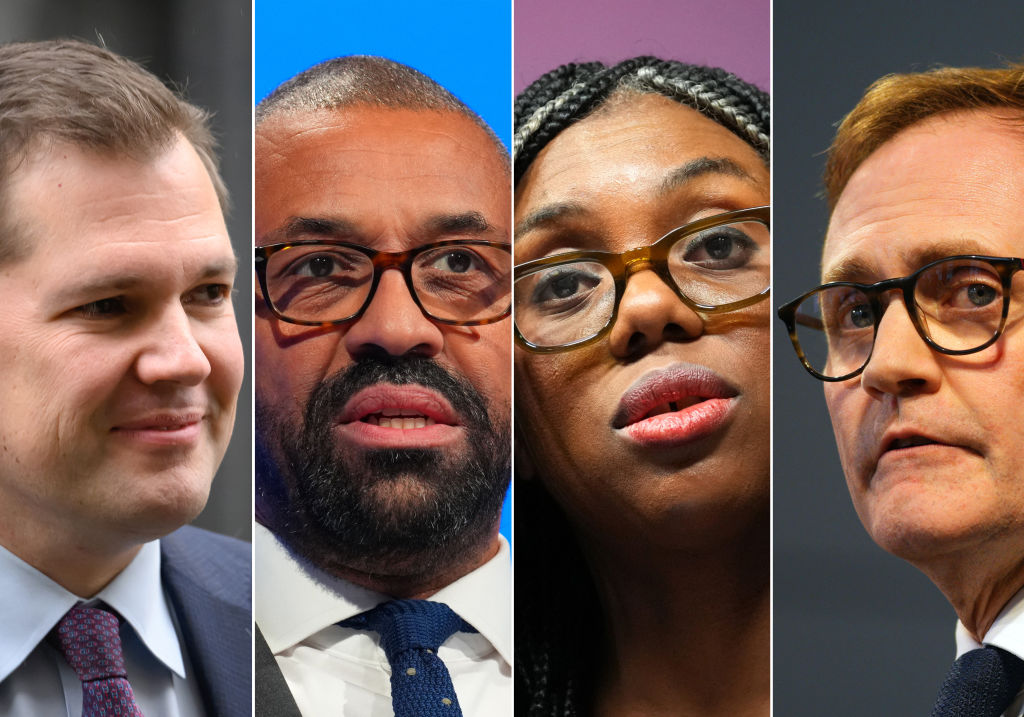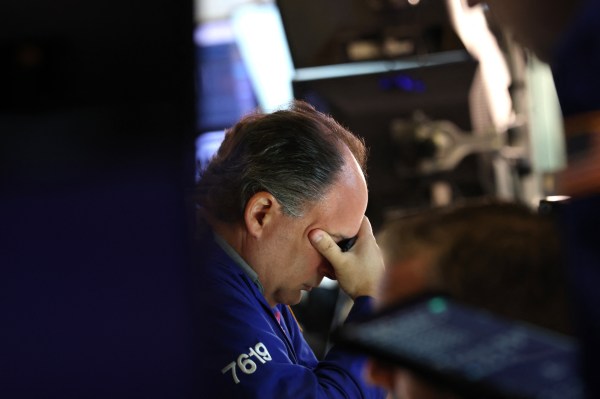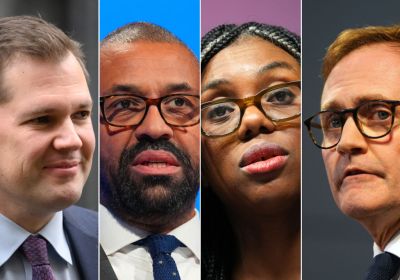A bruised Conservative Party is gathering in Birmingham, England, this week to begin the process of regrouping after a shattering summer electoral defeat. The party’s annual conference, which began Sunday and runs through Wednesday, will focus on the four remaining candidates in its third leadership election in two years.
The Tories are picking up the pieces after a July 4 general election left them with just 121 of their previous 371 seats in the House of Commons. The leadership contest will determine whether the party pivots to the right or to the center as it adjusts to being an opposition party for the first time after 14 years in control of the country.
The latest parade of would-be party leaders comes after a tumultuous stretch for Conservatives. The Boris Johnson premiership ended amid a scandal arising from the former PM’s violation of his own government’s COVID lockdown rules, Liz Truss’ 49-day premiership ended after her government’s mini-budget precipitated a crash of the British pound’s value, and former Prime Minister Rishi Sunak led the party to its worst ever defeat in the July general election.
In many respects, the field for leadership candidates was thrust wide open on July 4. The 250 MPs who lost their seats included a number of former ministers. Truss, prominent Boris Johnson ally Jacob Rees-Mogg, and former Attorney General Victoria Prentis were among those defeated by the ascendant Labour and Liberal Democrat parties.
The Tories’ centrist wing was hardest hit. Former Leader of the Commons and third-place finisher in the 2022 Tory leadership election Penny Mordaunt, former Defense Secretary Grant Shapps, former Education Secretary Gillian Keegan, and former Justice Minister Alex Chalk all found themselves without seats in Britain’s lower house.
Because the vote on the right was split between the Conservatives and the more populist Reform UK Party, a rightward tilt in the leadership contest is expected. “Given the composition of the post-apocalypse parliamentary party looks (at first glance at least) fairly evenly balanced between right and centre, it’s hard to imagine that at least one right winger won’t make it to the final two of the leadership race, and then be selected by the grassroots,” wrote Tim Bale, a professor of politics at Queen Mary University and author of The Conservative Party After Brexit.
In early September, the Conservative Party’s members of Parliament voted to narrow the field of party leader candidates to four, eliminating former Home Secretary Priti Patel and staunch Sunak supporter Mel Stride. The remaining candidates will try to woo supporters in speeches delivered at the party conference before another round of voting by MPs in early October narrows the field to two. The leader will then be selected in an online poll open to roughly 160,000 eligible party members between October 15 and 31, with the winner announced on November 2.
Who are the candidates?
Kemi Badenoch, the former secretary of state for business and trade, leads her competitors with the broader Tory membership, according to a YouGov poll of Conservative party members in August, finishing first in a six-way ballot and in every possible head-to-head matchup with the other candidates.
Badenoch, who also has been the minister for women and equalities, is best known for her hard-line stances against “woke” positions during her tenure as a minister. She pushed legislation calling for transgender athletes to compete with others of their biological sex rather than their gender identity, advocated for a less ambitious net-zero carbon dioxide emissions target when she ran for party leader in 2022, and was an outspoken critic of critical race theory. Most recently, she was involved in a high-profile spat with Dr. Who actor David Tennant over LGBT rights in the U.K.
“Mrs Badenoch leaves the strongest mark. She is vivid and brave,” Charles Moore, a member of the House of Lords appointed by Johnson, wrote for The Telegraph. “She makes Tories feel that at last someone is ready to take on socialism once more.” Moore also articulates some of the downsides of Badenoch’s candidacy, writing that “it is not only political opponents she likes to assail. She is such a pugilist that even Conservatives can feel bruised by her… After the years of Boris and the weeks of Liz Truss, some want a leader who is steadier, calmer and more strategic.”
Indeed, Badenoch faced accusations of creating an “intimidating atmosphere” during her tenure at the Department for Business and Trade, with at least three former staffers leaving the department due to what they allegedly said in private were her “bullying and traumatizing” remarks in meetings.
While the YouGov poll favors Badenoch, former Minister of State for Immigration Robert Jenrick has claimed the most votes from MPs so far in this race, with 33 MPs to Badenoch’s 28 in the second voting round in early September. The former centrist quickly became a darling of the right during his tenure as Sunak’s immigration minister, demanding tough measures to tackle the increasing numbers of migrants attempting to reach the U.K. in small boats. He eventually resigned his post rather than supporting a moderated version of the Tories’ controversial policy that called for relocating asylum seekers and illegal migrants to Rwanda.
“Mr Jenrick is the one who has made up the most ground in the campaign so far,” Moore wrote. “Since his resignation as immigration minister last year, he has transformed himself from a seemingly rather identikit middle-ranking minister into a thoughtful and tough-minded campaigner.”
Jenrick’s candidacy also comes with a hint of scandal. In 2020, Labour and Liberal Democrat MPs accused Jenrick, then housing secretary, of improperly expediting approval for a housing development and saving its party-donor owner an estimated 45 million pounds (nearly $60 million) in council charges. Jenrick was also accused of breaking the U.K.’s strict COVID lockdown rules to deliver food and medicine to his parents. Though the government backed Jenrick’s actions during COVID, Prime Minister Boris Johnson eventually sacked him in 2021.
As leader, Jenrick has said he would move the Conservative Party toward the Reform Party, which enjoyed unprecedented success in the last election, arguing Conservatives need to put the upstart outfit “out of business.” Still, some Tories on the right flank of the party regard Jenrick with suspicion, pointing to his earlier criticism of anti-asylum rhetoric.
From the Conservatives’ more centrist wing, former Home and Foreign Secretary James Cleverly also has a strong chance to end up leader, collecting 21 MP votes in the most recent round of voting, tying with former Security Minister Tom Tugendhat. According to an August Ipsos poll, Conservative voters rated Cleverly, the only contender in the contest to hold multiple of the UK’s four prestigious “Great Offices of State,” as the most likely to be a good Conservative leader.
Cleverly’s campaign has focused largely on foreign issues. He has vowed to resurrect the Rwanda depotation policy but has stopped short of promising to leave the European Court of Human Rights, which challenged the legality of the program, contrasting with Jenrick and fellow candidate Tom Tugendhat. Cleverly also has made his pledge to spend 3 percent of GDP on defense a central focus of his campaign and has stumped with the former defense secretary. On domestic issues, Cleverly has called for an abolition of taxes on homeownership for homes worth more than 250,000 pounds (about $333,000), or 425,000 pounds for first-time buyers.
“Only James can unite our party, hold the government to account, and win the next General Election,” Conservative MP Gagan Mohindra posted on X. Echoing that sentiment, MP Peter Fortune called Cleverly “A communicator. A unifier. A leader.” in a statement endorsing him for leader.
Not everyone in the party shares this view of Cleverly as a skilled communicator who can unite the party, however. “It does seem a bit worrying that Mr Cleverly, who has held two of the great offices of state (the Foreign Office and the Home Office) is such a blank page”, Moore wrote in his op-ed. “Can anyone say, for example, what he really thought about immigration when he oversaw it?”
The fourth candidate, Tugendhat, was seen as a centrist by MPs during his first run for leadership in 2022 but has since backed some positions held by Badenoch and Jenrick. “We know what a woman is. We all want lower taxes. We all know national security must come before Treasury spreadsheets,” Tugendhat wrote in The Telegraph. “We all know that energy security and household bills come first.”
Moore views the Afghanistan war veteran as having a more “unblemished record” than his competitors. “In his admittedly brief ministerial career, he well articulated his security portfolio, setting it in its global context. ... Against that, is the feeling among some that he has not built up a strong enough parliamentary base and is a bit to the Left at a time when momentum is with the Right,” Moore wrote.
With Prime Minister Keir Starmer already having faced a crisis with anti-immigrant riots in August and currently embroiled in a scandal over accepting gifts from wealthy donors, the Labour leader’s approval rating has dropped below Sunak’s. If the Conservatives can unite strongly behind a Sunak successor, as the ousted prime minister urged them to do in a speech at the conference, they could regroup for a shot at regaining power when the next election is called. Finding a new identity will start with finding a new leader.






Please note that we at The Dispatch hold ourselves, our work, and our commenters to a higher standard than other places on the internet. We welcome comments that foster genuine debate or discussion—including comments critical of us or our work—but responses that include ad hominem attacks on fellow Dispatch members or are intended to stoke fear and anger may be moderated.
With your membership, you only have the ability to comment on The Morning Dispatch articles. Consider upgrading to join the conversation everywhere.